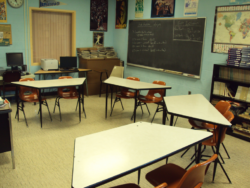Education Expert Rhonda Stern on Critical Thinking, Starting Early
March 04, 2014 :: Admissionado Team
It’s the beginning of a new year, which is always a good time to take stock and ask, Am I doing all that I could be doing? We here at Admissionado ask ourselves this constantly. Are we doing all we can? We are here to help students succeed, not only on their school applications, but also in the long-term, and we are always trying to find ways to better serve the students and families who need help. That’s our permanent New Year’s resolution.
So to that end, we talked with Rhonda Stern, Chicago-based educator, education expert, and blogger who works with gifted students, about what we need to be doing and how education needs to improve.
What Testing Culture Lacks
What, exactly, is the problem with traditional education? Basically, it’s incomplete. “There’s so much repetition,” says Rhonda. The culprit? Our current culture of testing:
“I think that there needs to be a shift where teachers use assessments for diagnostic processes more than anything else and a shift away from comparing peers. Everybody is different and we’re all going to end up with different purposes in our lives, and driving testing just narrows the curriculum because teachers focus on what’s being tested in terms of their teaching and don’t give their subjects the true time that should be given them.”
As it stands, and as we probably know all too well, most teachers gear their lessons towards exams (state, national, and even regular class exams and quizzes) instead of teaching broader skills like problem-solving and critical thinking. Many tests purport to help students develop these skills, but few actually do.
Because of the testing culture and the repetitive teaching it breeds, students are learning how to think like a standardized test: by rote, and with the mindset that there is only one best answer, and that being smart is about being able to come up with that one best answer rather than about thinking independently, creatively, and critically. A test-driven curriculum restricts teachers from being able to teach beyond the test and teach the kind of skills that will be crucial once grade school (and standardized testing) is over. Our focus here at Admissionado is on teaching the skill sets that students will need not only to succeed in school but long after.
((Audio: Rhonda Stern on Curriculum and Testing))
((Audio: Rhonda Stern on What Isn’t Being Taught))
Good Teaching
While this testing culture is in place (and we’re not going to escape it anytime soon, according to Rhonda,) it’s up to educators to push their students. “I think the teacher needs to have high expectations so the students know this teacher means business,” Rhonda says. “It’s amazing what kind of work you can get out of elementary students.” Rhonda had elementary school kids reading Supreme Court opinions and pitching environmental legislation to their village environmental commision, for example. Creative learning activities such as these engage students and get them thinking at a higher level.
We at Admissionado emphasize the quality of our mentors and our innovative learner-driven teaching. Our mentors aren’t instructors–we don’t want our students to memorize material and repeat it back to us. We guide our students to come to the answers on their own. That’s because we truly believe that learning through experience and coming to conclusions independently is the most effective way to retain lessons and to apply them in the future.
((Audio: Rhonda Stern on How to Assess Critical Thinking))
((Audio: Rhonda Stern on What Makes a Great Teacher))
Critical Thinking, Starting Early
What does it really come down to? Teaching critical thinking “from birth on,” says Rhonda. “Kids understand the nature of their choices, whether they want a light on or a light off, even as an infant.” So what we want to do is to hone these natural skills/intuition that children have and turn them into applicable skills. That’s why at Admissionado, we’re starting early.
And, as Rhonda explained to us, there are many, many ways to teach critical thinking. Rhonda is a particular fan of problem-based learning: “Students master content through a learning process and then come up with a product, a suggestion.” One year she had her fourth grade students looking at climate change, and got together to encourage the local city to get rid of polystyrene products. So the product was some legislation that the city actually considered. “And through the whole process they encountered different viewpoints from local purveyors in the city, they also went to a village board meeting. So it’s a great way to learn and integrate multiple perspectives.” Our mentorship at Admissionado is based on practical application. For example, we might have students design a product, pitch it to a board, and then market it. This exercise alone targets creative skills, problem-solving, presentation and communication, decision-making, strategy, and more–the kind of skills Rhonda teaches her students.
((Audio: Rhonda Stern on Defining Critical Thinking))
((Audio: Rhonda Stern on Creative Thinking))
Modes of Learning
It’s also crucial to find multiple pathways into teaching critical thinking: visual, audio, kinesthetic, etc. “I try to teach it in as many modalities as I can. Ninety percent of kids learn kinesthetically…get them out to feel [how] the surface [of] the blacktops are a lot hotter than the grass in terms of teaching climate change.” Learning from direct experience is always engaging to kids. And a lot of local education and arts initiatives are also here to help. “I live in Chicago and the Field Museum lets educators take out kits, so if you have kids petting different animal furs they can distinguish among animals and learn more.” And for us at Admissionado, it’s about actually practicing real-world applications rather than just talking about them. This not only teaches information, but also teaches important aspects of character development such as grit, persistence, bouncing back from failure, the ability to evaluate and reiterate. These are the character traits of high achieving students; traits that keep kids engaged in the classroom, able to power through boring material, to challenge themselves and to want to challenge themselves.
Good teachers also need to help students figure out how they learn best, and how to see thinking as a process. “For example,” Rhonda says, “I learn best by making connections, but some other people might learn best by following logical syllogisms, and it’s incumbent on the teachers to help students understand how to maximize their learning.” So a great teacher won’t just tell students the information, but will actually help them learn how they as individual learners meet and take in information. That’s self-knowledge that goes a long way in the future. Which goes hand in hand with Admissionado’s learner-driven mentorship. When students have to find answers on their own, they’ll develop an understanding of how they learn.
Kids who understand how they learn, learn better. Educators call this “metacognition.”
((Audio: Rhonda Stern on Problem-Based Learning))
((Audio: Rhonda Stern on The Best Way to Teach Critical Thinking))
The Educational Journey
Current traditional education is too focused on the short-term aspects of education–testing and comparing numbers–rather than the long-term, lifelong skills that truly lead to individual students’ intellectual growth. “Education is a process,” says Rhonda. “It’s a journey. And teachers and kids have to get ready to participate in that journey because it’s not a race. It’s a marathon.” We wholeheartedly agree. We don’t just set the goal at academic achievement or college admissions – we set the goal farther. We set the standards higher. In today’s constantly evolving and increasingly competitive economic market, the future is more uncertain than ever. We want to prepare our students not just to compete in school, but to compete and succeed in the real world. Skills like communication, persuasion, decision-making, problem-solving–these are skills that take you far.
Are you ready to start training for that marathon? We sure are.
((Audio: Rhonda Stern, “Learning Should Be Fun”))
((Listen to the full interview with Rhonda Stern here))

Rhonda Stern has been in the field of gifted and talented education since 2000. She is also a certified mediator and an attorney. Currently, Stern is a doctoral student in Curriculum Studies at DePaul University. Stern taught in Highland Park, Illinois for nine years and works with gifted, talented, and twice exceptional students at Educational Enrichment Consulting, www.enrichyourkids.com. Stern sits on the Social and Emotional Committee of the Illinois Association for Gifted Children and is a lecturer and writer on gifted and talented issues.



